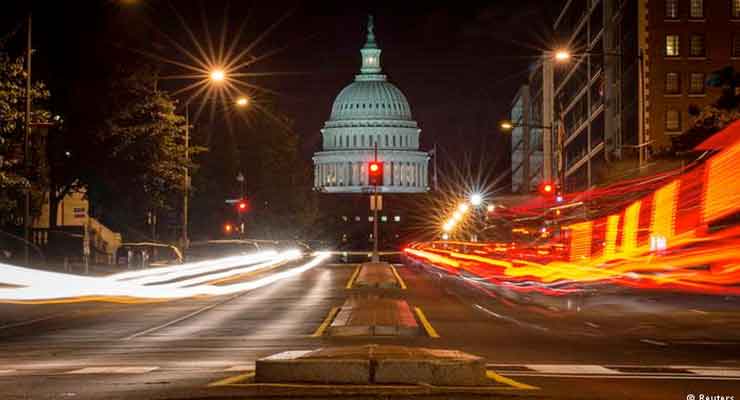 Senate Democrats and Republicans have failed to reach a compromise on a short-term funding measure. The partial shutdown comes on the first anniversary of US President Donald Trump’s inauguration.
Senate Democrats and Republicans have failed to reach a compromise on a short-term funding measure. The partial shutdown comes on the first anniversary of US President Donald Trump’s inauguration.
The US government shut down on Saturday after the Senate failed to pass a procedural vote on a stopgap budget to fund the government.
Most Democrats and some Republicans voted against ending debate and advancing to a vote on a short-term bill to fund the government for the next month in a late-night vote on a House-passed plan.
The failure of the motion means that President Donald Trump will mark exactly one year since taking office with the first shuttered government in five years.
The Republicans, who control the White House and both chambers of Congress, looked set to bear the brunt of responsibility for the shutdown even as they sought to pin blame on Democratic obstructionism.
The vote failed 49 to 50. Sixty votes were needed to proceed to a vote on the House bill.
Republicans were asking for a four-week stopgap funding measure to keep the government running.
Democrats, who are seeking to capitalize on any Republican failings during a mid-term election year, may also be faulted after they wouldn’t budge on demands to protect from deportation some 700,000 “Dreamers” who came to the country illegally as children. They sought an even shorter funding measure in order to maintain pressure over immigration issues.
Following the vote, Trump blamed the Democrats for the shutdown, saying they were more interested in protecting illegal immigrants than in national security.
The White House said it would not negotiate with the Democrats on immigration until the shutdown ended.
“The president will not negotiate on immigration reform until Democrats stop playing games and reopen the government,” Sarah Sanders said on Saturday.
Likely minimal impact
A Washington Post-ABC poll conducted before Friday’s 11th-hour vote found that 48 percent of respondents faulted Trump and Republicans, compared to 28 percent who blamed Democrats.
“As for who gets the blame, people have tended to blame Congress over the president, but given that Republicans control both, it’s likely that they will get almost all of the blame,” Phil Klinkner, a professor of government at Hamilton College, told DW. “As for long-term effects, there probably won’t be much other than reinforcing the notion that Trump and congressional Republicans are pretty ineffective.”
It was unclear for how long the federal government would shut down. The last shutdown in 2013 lasted 16 days.
White House budget director Mick Mulvaney told reporters before the failed vote that “there’s a really good chance it gets fixed” before government offices open again on Monday.
A short-term government shutdown will likely have minimal impact, especially if only over a weekend.
US federal services and any military operations that are considered essential will go on, but thousands of government workers are set to be furloughed if no deal is reached before Monday.
tj,cw/jlw (AFP, AP, dpa)
